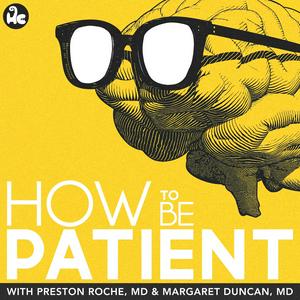Treating Back Pain and Trending on Tik Tok
In this episode Preston and Margaret welcome their first guest, neurosurgeon and content creator Dr. Betsy Grunch (aka Lady Spine Doc), for a deep dive into pain—how we treat it, how we misunderstand it, and how the system often fails those who experience it.
Takeaways:
Pain Is Not Just Physical: Chronic pain isn’t just about physical damage—it involves neurological, psychological, and emotional factors that make treatment complex.
Back Surgery Isn’t Always the Answer: Failed back surgery syndrome is common, often because patients receive the wrong procedure or aren’t properly prepared for surgery.
Empathy Improves Patient Outcomes: Research shows that patients who feel heard and understood by their doctors have better surgical and pain management outcomes.
Social Media Shapes Medical Conversations: Platforms like TikTok have transformed how patients and doctors discuss pain, sometimes for better—but also with risks of misinformation.
Medical Training Can Be Dehumanizing: The culture of surgery often discourages emotional connection, but rediscovering empathy is key to being a great physician.
—
Want more Dr. Betsy Grunch:
TikTok: https://www.tiktok.com/@ladyspinedoc?_t=8rhZfY7LgLe&_r=1
Twitter: http://www.twitter.com/ladyspinedoc
Instagram: http://www.instagram.com/ladyspinedoc
Facebook: https://www.facebook.com/ladyspinedoc
YouTube: https://youtube.com/@ladyspinedoc
LinkedIn: https://www.linkedin.com/in/drgrunch
Amazon: https://www.amazon.com/shop/ladyspinedoc
Watch on YouTube: @itspresro
Listen Anywhere You Podcast: Apple, Spotify, PodChaser, etc.
—
Produced by Dr Glaucomflecken & Human Content
Get in Touch: howtobepatientpod.com
Citations:
Chapters 1.16 and 27.15. Sadock, Benjamin J, et al. Kaplan & Sadock’s Comprehensive Textbook of Psychiatry. 11th ed. Philadelphia, Wolters Kluwer, 2025.
Oliveira CB, Maher CG, Pinto RZ, Traeger AC, Lin CC, Chenot JF, van Tulder M, Koes BW. Clinical practice guidelines for the management of non-specific low back pain in primary care: an updated overview. Eur Spine J. 2018 Nov;27(11):2791-2803. doi: 10.1007/s00586-018-5673-2. Epub 2018 Jul 3. PMID: 29971708.
Stanford Center for Chronic Pain and American Chronic Pain Association Guide.
https://www.acpanow.com/acpa-stanford-guide.html#/
George SZ, Fritz JM, Silfies SP, Schneider MJ, Beneciuk JM, Lentz TA, Gilliam JR, Hendren S, Norman KS. Interventions for the Management of Acute and Chronic Low Back Pain: Revision 2021. J Orthop Sports Phys Ther. 2021 Nov;51(11):CPG1-CPG60. doi: 10.2519/jospt.2021.0304. PMID: 34719942; PMCID: PMC10508241.
https://pubmed.ncbi.nlm.nih.gov/30265840/
https://www.ncbi.nlm.nih.gov/books/NBK219252/#:~:text=Pain%20is%20a%20subjective%20experience,relieving%20or%20terminating%20the%20experience.
Learn more about your ad choices. Visit megaphone.fm/adchoices

